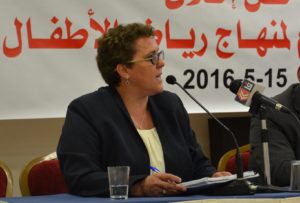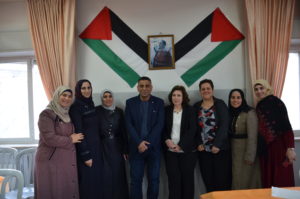A Career in Early Childhood Development Leads Back to Palestine
Posted in: Programs
By Dr. Ilham Nasser
Dr. Ilham Nasser reflects on the journey that led her to work with Anera as an early childhood education specialist and become a leader in drafting and launching the first national curriculum for preschool and kindergarten education in Palestine.
Research studies inform us that the first six years of life are critical for the healthy growth and development of brains and bodies. Healthy early childhoods result in robust nations and future generations.
My children were the primary motivation for me to learn more about early childhood development (ECD). I pursued this interest through my research, and read all of the available child development and parenting literature.
I raised two children while pursuing my Ph.D. and working to support my family while my husband was still in school. Now, as adults, my children ask me how I accomplished all of that. Truthfully, I don’t know how I managed it. It was simply something I needed to do, as an immigrant who wanted the best for her children.
Building a Career

After obtaining a master’s degree in counseling, I was promoted to the role of teacher and taught preschoolers for four years in Virginia. This experience stimulated my interest in research on young children. I returned to school to seek a Ph.D. in Human Development and Child Study at the University of Maryland, College Park. My research focused on the expectations that Palestinian parents have for their children when they are 4-6 years old.
My position as an educator in ECD allowed me to supervise teachers-in-training and active teachers. I did that for over ten years and learned a great deal. I also began teaching curriculum development for young children, and reviewed curricula for Virginia schools.
With this breadth of experience, I was well-placed to lead curriculum development in Palestine.
Early Childhood Development in Palestine
Palestinian society values education as a tool for emancipation and social mobility. Education starts early to ensure our children are knowledgeable, confident, and creative. We provide children with tools to solve problems, take pride in who they are, and eventually take an active role in their communities.
I can still remember my mother trying to register me for preschool when I was only four years old. The school turned us away because I was too young.
I had to wait until I turned five. I went to a private school in Nazareth, known for its academic focus and for being very strict socially. It was a difficult, formative experience for me. I swore to myself that I would run a school my own when I grew up.
Framework and Curriculum

In 2016, with the support of the current Minister, Dr. Saidam, I took a semester off to spend with Anera staff in Palestine. The principle goal was to develop a curriculum framework.
The curriculum for ECD provides guidelines for educators and the broader society to identify what is important for children to learn, why, and how (the ways that they enjoy learning).
In some ways, the framework is for adults rather than children, while the curriculum, including the teachers’ manual, is for children and about children.
The framework indicates growth and development outcomes that inform teachers, parents, and policy makers about what to expect from children after completing kindergarten. The manual provides teachers with hands on strategies for teaching and learning with young children.
Discarding “Recipe Books”
The main challenge was convincing the team and all involved in the writing to move away from a “recipe books” type of curriculum. Some were skeptical of eliminating day-by-day and step-by-step plans. It meant trusting the teachers and providing space for them to be creative in meeting the needs of their own classrooms.
The participation of local NGOs working in ECD during the meetings was a critical source of support for the approach. Their presence was vital as their trainings are instrumental in supporting teacher implementation of the curriculum.
I felt overwhelmed by the trust placed in me by the Ministry and the local NGOs. After I successfully led the drafting of the Framework, the Ministry’s team supported me in every implementation step that followed.
Challenges lay not only in the writing of the curriculum but also in leading the task force of 20 people, all of whom were experts with very strong opinions.
Some nights I awoke with new ideas or thinking of a problem that needed fixing.
During the writing workshops, one of the team members confided in me his anxiety, saying “This is a big job.” “Yes,” I answered, “and we are the only ones who can do it, so relax!”
A Sense of Accomplishment
Being involved in writing the first national curriculum for preschool and kindergarten education in Palestine brought me a tremendous sense of pride. I was filled with emotion, watching the children participating in the launch ceremony.
I would like to see every preschool provide children with a friendly and loving environment – where teachers are able to play, sing, and dance with their students. Life is so stressful for children in many locations. Having a preschool that provides a safe space and a play-focused curriculum is very critical.
Involvement with Anera
I first became involved with Anera’s education committee in 2004, at the invitation of Nancy Nye. Peter Gubser was the president and he asked me to help with initiating Anera’s first ECD education program in Gaza. Ever since, I have been involved with the board, and also chaired the education committee until December, 2017.
My leadership of the committee was instrumental in recruiting a diverse group of people with wide-ranging expertise. I also tried to make serving on the committee a fun and enjoyable experience, shifting it from a reporting committee to a hub for brainstorming ideas and supporting Anera’s strategic plan for ECD in Palestine. We also provided support to ECD aspects of Anera’s Lebanon programs.
Saluting Anera’s ECD Team
Credit should be given to Anera’s ECD team. They were the main catalyst for this project. The team in Palestine is excellent and very professional. Anera’s work has been very collaborative and thorough. Without the team’s advocacy for ECD with the ministry and others, the framework wouldn’t have happened. The Anera team kept reminding all of us that it was about the children. Their positive approach was contagious.
The ECD team is making a difference for young Palestinian children in marginalized and remote locations. Despite the difficulties, they don’t give up.
